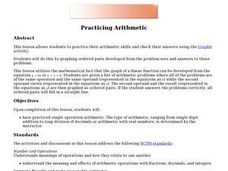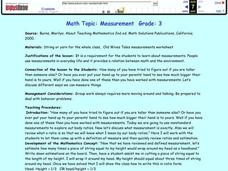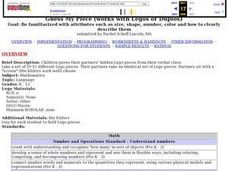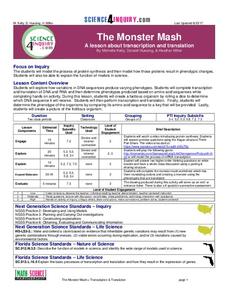Curated OER
Best Guesser
Fifth graders develop strategies for estimating ages, and illustrate results by graphing and interpreting scatter plots to compare x and y coordinates.
Curated OER
Buying My First Car
Students pretend they are about to buy their first new car. They must do all the calculations necessary to estimate the cost of purchasing the car. They see that the math they learn in school really does have real-life applications.
Curated OER
Conversions That Make Cents
Eighth graders practice calculating problems using addition, subtraction, multiplication and division. They estimate solutions to algebraic problems. They also graph their solutions.
Curated OER
Scavenger Hunt
Second graders participate in a Scavenger Hunt to find out how long 1 cm is. They then find 10 objects that estimate to be 1 cm in length and record their findings on the table provided and check their estimates using a ruler.
Curated OER
Charting Attendance Rate of Busch Gardens
Sixth graders, in groups, are given different parts of the whole project. They use information from Busch Gardens to explore line graphs, averages, and other math vocabulary.
Curated OER
A Matter of Proportion
Students measure the relative heights of the mosaic giraffe and its trainer and compare their proportions to an actual giraffe and zoo trainer.
Curated OER
Particulate Sampler
Students estimate the extent of particulate air pollution present in their neighborhoods.
Curated OER
Water Use Around the World
Students compare their water use with other places around the world. They calculate the amount of water they use in a week and discuss how to conserve water. They discover the amount of clean water throughout the world.
Curated OER
Practicing Arithmetic
Students practice single operation arithmetic ranging from single digit addition to long division of decimals or real numbers using Graphit. They use data sets and rules to graph ordered pairs.
Curated OER
Exploring Japan Through Learning Centers
Students explore the Japanese culture and literature through various learning centers. They compare and contrast story details in two stories and complete a Venn diagram. After comparing the stories, they rotate to different centers and...
Curated OER
Measurements
Third graders brainstorm a list how they use measurements everyday. Using string, they cut a piece long enough as their height and complete ratios using their arms and legs about old tales about measurements. They compare and contrast...
Curated OER
FILLING IN THE GAPS - Acquiring and Analyzing Satellite and Ground-Based Data
Students monitor rainfall, compute daily averages, and compare their methods of computation to those used by actual researchers using satellite observations.
Curated OER
Milky Way Galaxy
Students simulate stars in the Milky Way Galaxy using newspaper prints. In this space science activity, students compare the number of 'stars' on their page to familiar things. They calculate how many pages they need to have the same...
Curated OER
Absolute Ages of Rocks
For this rocks worksheet, students review the process of absolute dating of rocks and compare it to the relative dating process. This worksheet has 16 fill in the blank questions.
Curated OER
Around and Across
Tenth graders investigate the circumference and diameter of a circle. In this geometry lesson, 10th graders relate circumference to diameter. They create a scatter plot to estimate the value of pi.
Curated OER
Guess My Piece -working with Legos
Learners participate in guessing their partners' hidden Lego pieces from their verbal clues. They work in partners to accomplish their goals. They are meeting a variety of math standards by completing this lesson.
Curated OER
What's in the Bag?
Help your students identify the attributes of two-dimensional shapes. They read the book Round is a Mooncake, and use pattern blocks to sort shapes. Students sort shapes according to their attributes.
Computer Science Unplugged
Twenty Guesses—Information Theory
How do we determine how much information to include and what can be left out? By playing a game of 20 questions, the class generates the best strategies for finding a number. They then move on to guessing the next letter in a short...
Pennsylvania Department of Education
Freckle Face
Students collect and record data. In this early data analysis lesson, students gather data about their partners face. As a class, the students use tally marks and pictographs to record the data and answer question about the information...
Curated OER
Estimation and Your TV Diet
Learners develop estimation skills by using real life situations. In this estimation lesson plan students collect data about their television watching habits. They make hypothesis about the number of hours they watch, how many...
Curated OER
Quilt Squared
Students study West Virginia quilts. In this mathematics lesson, students use symmetry, geometric shapes, and patterns to create their own quilt square.
Curated OER
Patterns Here, There, and Everywhere!
Upper graders access the Microsoft Word program and create patterns by utilizing certain keys on the keyboard. They create picket fences, smiley faces, and hearts. It seems that this lesson has as much to do with keyboarding skills as it...
Curated OER
Probability Games and Activities, Unit 10
Looking for tangible ways to practice probability with your class? Through 4 activities, students practice with experimental probability, using math to make educated guesses, then testing it through physically completing the experiment....
Science 4 Inquiry
The Monster Mash
Young scientists create monsters by applying their knowledge of transcription and translation. They randomly find the DNA, assign it a codon, and build monsters piece by piece.

























